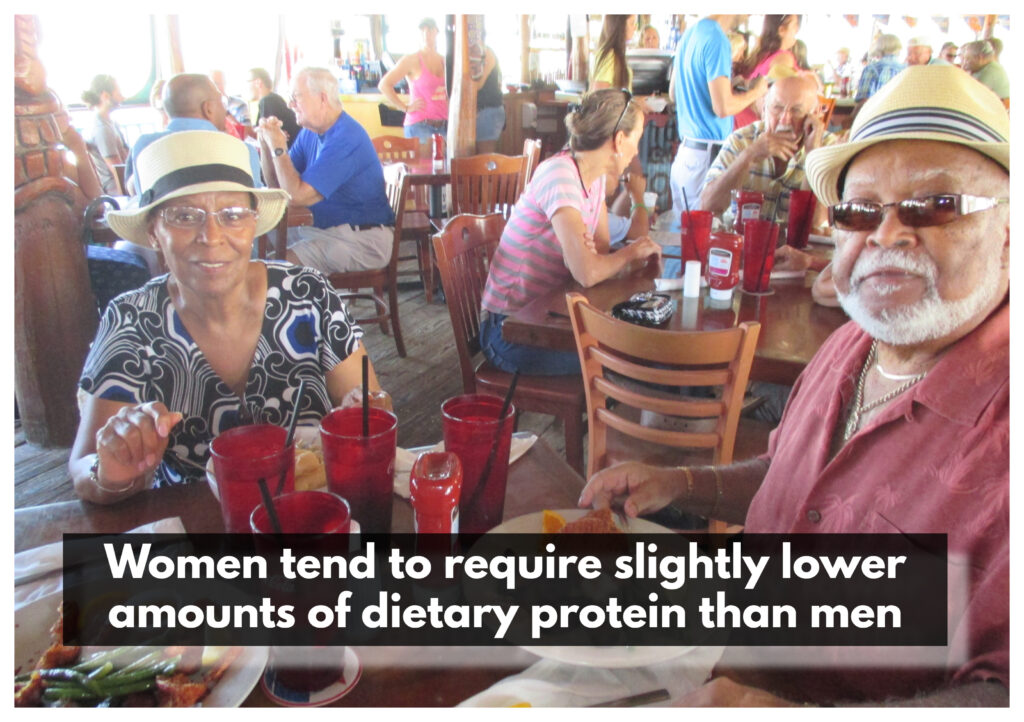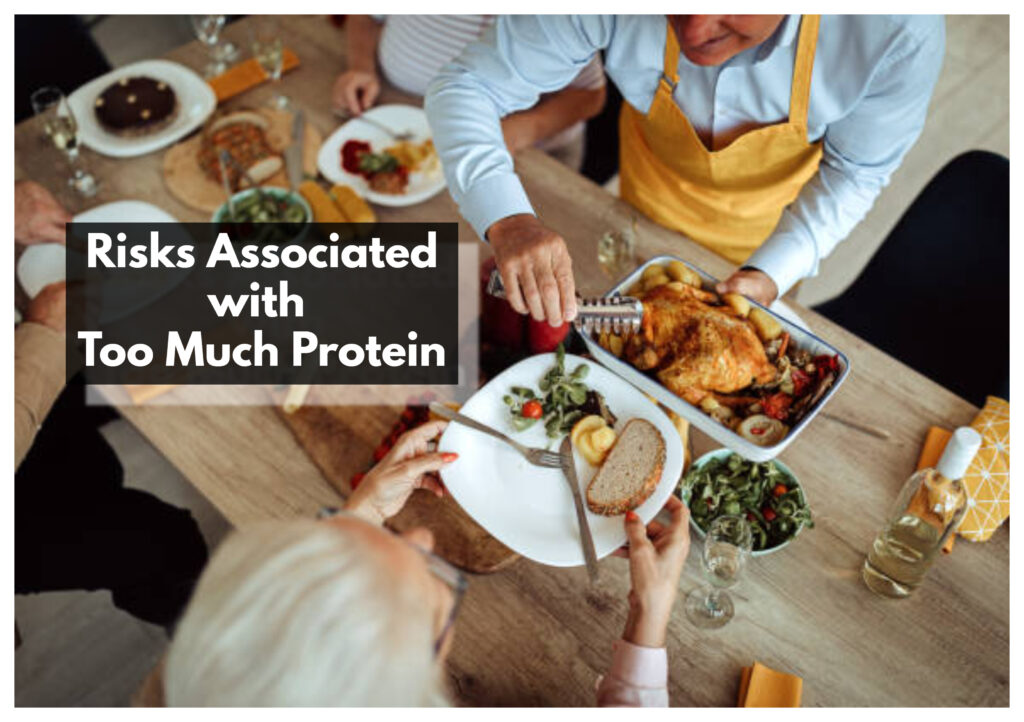As we get older, what our bodies need in terms of nutrients shifts a bit. Protein is one of those big nutrients that become super important for seniors. So, you might be wondering, just how much protein should seniors be getting?
Protein is super important for keeping muscles in good shape, helping them grow, and get fixed up, and for making all those important bits like enzymes and hormones that our bodies need.
Not getting enough protein can lead to muscles getting weaker and smaller, which means less strength and not-so-great balance. Think of protein as the hidden superpower juice for older adults, helping their muscles stay tough and mending any wear and tear.

Contents
The Power of Protein
In this blog post, we’ll be exploring its power and how much protein senior citizens need to stay healthy and independent. We’ll look at the benefits and how much consumption is recommended, and ways to incorporate more of it into their diet.
With the right balance of protein, seniors can maintain their strength and quality of life.
Prefer to listen rather than read?
Benefits of Protein for Senior Citizens
Protein is like the secret superhero fuel for seniors, making sure their muscles stay strong and repairing their tissues. You see, as people get older, their bodies become a bit lazy in handling protein.
Let’s make it a top priority to keep our seniors filled with all the great things their bodies need to keep them feeling good and smiling. If we don’t, they could begin to lose muscle and strength.
Helps to Counter Age-Related Muscle Loss
Eating protein is like giving your muscles a little boost, especially as we get older and they tend to get a bit weaker. It’s not just for muscles, though! Protein is super important for keeping your bones strong and making sure your body can create all the special little helpers, like hormones and enzymes, that keep everything running smoothly.
Essential Protein Senior Citizens Need for Maintaining a Healthy Weight
Eating enough protein is not just about keeping those muscles flexed; it’s also a big helper when it comes to managing a healthy weight. Why? Because it keeps your metabolism ticking like a well-oiled clock.
Especially for the senior crowd, getting the right amount of protein senior citizens need from their meals is super important for staying on top of their health game. Plus, it’s a secret weapon against some sneaky health troubles that tend to show up later in life, like weak bones, high blood sugar, heart issues, and even some types of cancers.
Protein-rich foods such as lean meats, eggs, fish, poultry, beans, legumes, seeds, nuts, and dairy products are also excellent sources that can help seniors maintain a healthy weight, strong bones, and balanced nutrition.
Helps Support the Immune System
Additionally, it helps support the immune system, which is especially important for seniors who are at a higher risk of certain diseases and illnesses.
It also helps to improve cognitive function, keeping seniors sharp as they age. By getting the right amount of protein senior citizens need, they can enjoy a better quality of life as they age.

Factors to Consider For Recommended Daily Intake
When considering the recommended amount of protein senior citizens need, there are a number of important factors to keep in mind. Age, gender, health status, lifestyle habits, and dietary preferences all play a role in determining the right amount of protein senior citizens need to maintain health and wellness.
Age
- Age is an important factor when it comes to determining the optimal amount of protein senior citizens need for maintaining overall health and wellness.
- Adults over the age of 65 should aim to consume at least 0.8 grams per kilogram (2.2 lbs) of body weight daily.
- Approximately 30% of whole-body protein turnover is attributed to protein tissue in younger adults, however, this rate decreases to 20% or less in adults aged 70 and above.
- This phenomenon has resulted in senior citizens over 70 requiring more protein per kilogram of body weight than younger adults.
- The decline in whole-body turnover is due to a gradual decrease in muscle mass, known as sarcopenia, and an increase in the rate of protein degradation.
- Sarcopenia is a natural part of the aging process and is associated with a decrease in physical performance and a higher risk of injury and falls.
Gender
- Ladies often need a bit less protein in their meals compared to guys, especially when we’re talking about senior citizens.
- But hey, it’s not a one-size-fits-all thing – how much protein senior citizens need really depends on how active they are and their health situation.
- This is due to the fact that women tend to have a lower body weight and muscle mass than men, meaning that their needs are slightly lower.
- The recommended daily intake for women is approximately 46 grams per day, which is about 15 percent of the daily caloric intake for most women.
- Men, on the other hand, should aim for approximately 56 grams per day, which is around 17 percent of their daily caloric intake.
- Generally speaking, the recommended daily protein senior citizens need for women is slightly lower than that of men.

Health Status
- Seniors with underlying health conditions, such as diabetes or kidney disease, may need to adjust their protein intake accordingly.
- For those who have diabetes, the recommended daily intake for seniors is 0.8-1.2 grams per kilogram of body weight.
- For those with kidney disease, the recommended daily intake is typically lower, at 0.6-0.8 grams per kilogram of body weight.
- It is also important to consider the quality of sources, as seniors with certain health conditions may need to opt for lean, low-fat sources of protein, such as fish, chicken, and low-fat dairy.
- Additionally, seniors who experience significant weight loss may need to increase their protein intake in order to maintain healthy nutrition levels.
- It is important to consult with a healthcare provider to determine the optimal amount of protein senior citizens need to meet an individual’s needs.
Lifestyle Habits
- The recommended daily intake amount of protein senior citizens need can vary depending on their lifestyle habits.
- Those who are more active may require more than those who are less active, while seniors may need slightly more than younger adults.
- It is also important to consider body composition, as those with lean muscle mass may need higher amounts than those with a higher body fat percentage.
Dietary Preferences
- The recommended daily amount of protein senior citizens need is dependent upon individual dietary preferences.
- Vegetarian and vegan diets can provide adequate protein for a balanced nutritional diet.
- Plant-based proteins like tofu, tempeh, beans, legumes, nuts and seeds can all provide a rich source of protein.
- Additionally, there are many plant-based pseudo-meats that contain a high amount of protein, such as seitan, veggie burgers, and meatless meatballs.
- Dairy products are another popular source for those who are vegetarian and lacto-ovo vegetarian.
- Additionally, many kinds of cereal and grains are rich in protein, meaning that vegetarians and vegans can easily incorporate them into their diets.
It is important to note, however, that the individual amount of protein senior citizens need can vary based on factors such as body weight, height, exercise levels, and general activity levels. Foods that are high in protein can also help keep you full longer and provide you with the energy you need throughout the day.
Therefore, it is best to consult a qualified healthcare professional to determine the amount of protein senior citizens need.
Protein Sources for Seniors
It is especially important to ensure that we are getting enough protein in our diets. Here are three protein sources that are ideal for seniors:

Eggs
- Eggs are an incredibly versatile and nutritious food, providing an excellent source of protein senior citizens need – one egg contains approximately six grams of protein.
- They are also jam-packed with essential vitamins and minerals, including vitamins A, B12, B2, D, and E, as well as minerals such as calcium, iron, phosphorus, and zinc.
- Additionally, eggs are relatively low in calories and can be prepared in a variety of ways, making them the perfect food for breakfast, lunch, dinner, and snacks.
Cottage Cheese
- Cottage cheese is a great source of protein senior citizens need and is a popular choice among those looking to maintain a balanced and healthy diet.
- One cup of cottage cheese contains 28 grams of protein, as well as beneficial levels of calcium and vitamin A, making it an excellent choice for those looking to boost their daily intake of these essential vitamins and minerals.
- In addition, cottage cheese is relatively low in fat and carbohydrates, making it an ideal snack choice for those looking to maintain an overall balanced diet.
- With its high nutritional value, low-fat content, and palatable flavour, cottage cheese is an ideal choice for seniors looking to maintain a healthy and nutritious diet.
Nuts and Seeds
- Nuts and seeds are excellent sources of healthy fats, fibre, vitamins, and minerals.
- They are a nutrient-rich superfood, packed with essential macronutrients and micronutrients that are essential for good health.
- Nuts and seeds are an excellent source of complete protein, providing all the essential amino acids that the body needs to build and maintain muscle.
- Almonds, walnuts, and pumpkin seeds are particularly high in protein, with almonds providing 6g per 30g serving, walnuts providing 4.3g per 30g serving, and pumpkin seeds providing 5g per 30g serving.
- In addition, nuts and seeds are a great source of healthy fats, such as omega-3 fatty acids.

Risks Associated with Too Much Protein
Senior citizens need to take special care to ensure that their diets contain the proper amount of protein. Eating too much can have negative health implications, such as:
Increased Risk of Dehydration
- One of the most concerning is the increased risk of dehydration.
- This is because it is a nitrogen-rich food, and the body needs to excrete the nitrogen by-products, which can increase the amount of water the body needs to function.
- This can lead to dehydration if the body is unable to stay hydrated.
- Additionally, high-protein diets may also lead to electrolyte imbalances, further contributing to dehydration.
- To reduce the risk of dehydration, it is important to drink plenty of fluids, especially when increasing protein intake, to ensure the body has sufficient water to process the nitrogen.
Heart Disease
- Consuming more protein than is necessary for the body can put added strain on the heart, potentially leading to an increased risk of hypertension, coronary artery disease, and even stroke.
Increased Risk of Kidney Stones
- It can also lead to an increased risk of kidney stones and kidney failure due to the body’s inability to properly process the excess amount of protein.
- It can cause renal failure, as the kidneys become overburdened with the task of filtering the excess protein from the body.
Osteoporosis
- It can also interfere with the absorption of calcium, which is essential for healthy bones.
- Osteoporosis is a condition characterized by weakened bones, which can lead to a greater risk of fractures.
- It can lead to an increase in calcium excretion through the kidneys.
- This increase in calcium excretion can lead to a decrease in the amount of calcium available to the bones, leading to a decrease in bone density and an increased risk of fractures.
Liver Disorders
- It can lead to liver disorders, which can range from mild to severe.
- The liver plays a key role in the body by breaking down and removing toxins, so any disruption of this process can have serious consequences.
- It can also put an additional strain on the liver, leading to a condition known as hepatic steatosis, or fatty liver disease.
- This can be accompanied by a number of unpleasant symptoms, including abdominal pain, fatigue, and jaundice.
Type 2 diabetes
- Additionally, it can lead to weight gain and a higher risk of developing type 2 diabetes.
- It can lead to weight gain, which is a major risk factor for Type 2 diabetes.
- It can also cause your body to produce more glucose, requiring your body to produce more insulin to regulate it.
- Over time, this can result in insulin resistance, which is a major cause of Type 2 diabetes.
For these reasons, seniors should be mindful of the amount of protein they are consuming on a daily basis and strive to keep their intake within the recommended guidelines. It is especially important to ensure that they are not consuming too much as they may be more susceptible to the risks associated with it. To ensure a healthy diet, seniors should always ensure that the amount of protein they consume matches their individual health needs.

Tips for Incorporating Protein into the Diet
Protein is an essential nutrient for all individuals, but it is especially important for senior citizens. As we age, our bodies become less efficient at processing proteins, leading to a higher risk of malnutrition and muscle loss. To ensure you are getting enough protein, it is important to incorporate it into your diet.
Here are five tips for incorporating it into your diet as a senior citizen:
Eat Lean Proteins Such as Chicken, Fish, and Eggs
- It will help to keep your body strong and promote muscle growth.
- It can help to reduce the risk of chronic diseases, such as heart disease, stroke, high blood pressure, and type 2 diabetes.
- When selecting lean proteins, opt for grilled, baked, or boiled options.
- Avoid deep-fried as they are higher in calories and unhealthy fats.
Include a Small Portion With Every Meal
- To ensure enough amount of protein senior citizens need, adding a small portion with every meal is a great idea.
- Some simple and healthy ways to include protein are by adding hard-boiled eggs to your breakfast omelette.
- Or you can try adding nuts or seeds to your salads or vegetable dishes or having a small portion of lean meat or fish with your lunch or dinner.
Choose High-Protein Snacks, Such as Nuts and Seeds
- Snacks such as nuts and seeds can be easily carried with you and eaten on the go.
- You can also try incorporating protein-rich foods such as eggs, cottage cheese, beans, and fish into meals throughout the day.
- If you are looking for a quick and easy way to get your protein, look for a quality protein powder, which can easily be mixed into a smoothie or shaken with water.
Include Legumes, Such as Beans and Lentils, in Meals
- Legumes such as beans, lentils, and peas are a great source of protein senior citizens need and can be easily added to a variety of dishes.
- Whether you are cooking soup, making a salad, or preparing a main dish, adding legumes can help you to reach your daily protein requirements.
- Additionally, legumes are a great source of fibre, iron, and other essential vitamins and minerals.
Replace Some Carbohydrates With High-Protein Substitutes Such as Quinoa
- Replacing some of the carbohydrates in your meals with high-protein substitutes such as quinoa is an excellent way to increase your daily protein intake.
- Quinoa is a superfood, providing an abundance of essential nutrients like protein, fibre, vitamins and minerals.
- It is also a great source of antioxidants, minerals, and beneficial plant compounds that can have a positive effect on overall health.
- Consuming quinoa on a regular basis can decrease the risk of disease, improve digestion, and promote better weight management.
- Additionally, quinoa has a low glycaemic index, making it an ideal food for diabetics.
Conclusion
In conclusion, protein is a vital macro-nutrient for seniors and should be included in their diet. It not only helps seniors maintain muscle mass, but it can also promote better joint and bone health. Adequate intake amounts of protein senior citizens need can also help boost the immune system and prevent chronic diseases.
As important as the proper amount of protein senior citizens need, it should not be consumed excessively as it can be dangerous and cause further harm.
Was this article about How Much Protein Senior Citizens Need helpful to you? If so, you might also want to read Exploring the Ethical Delima of Assisted Dying.



